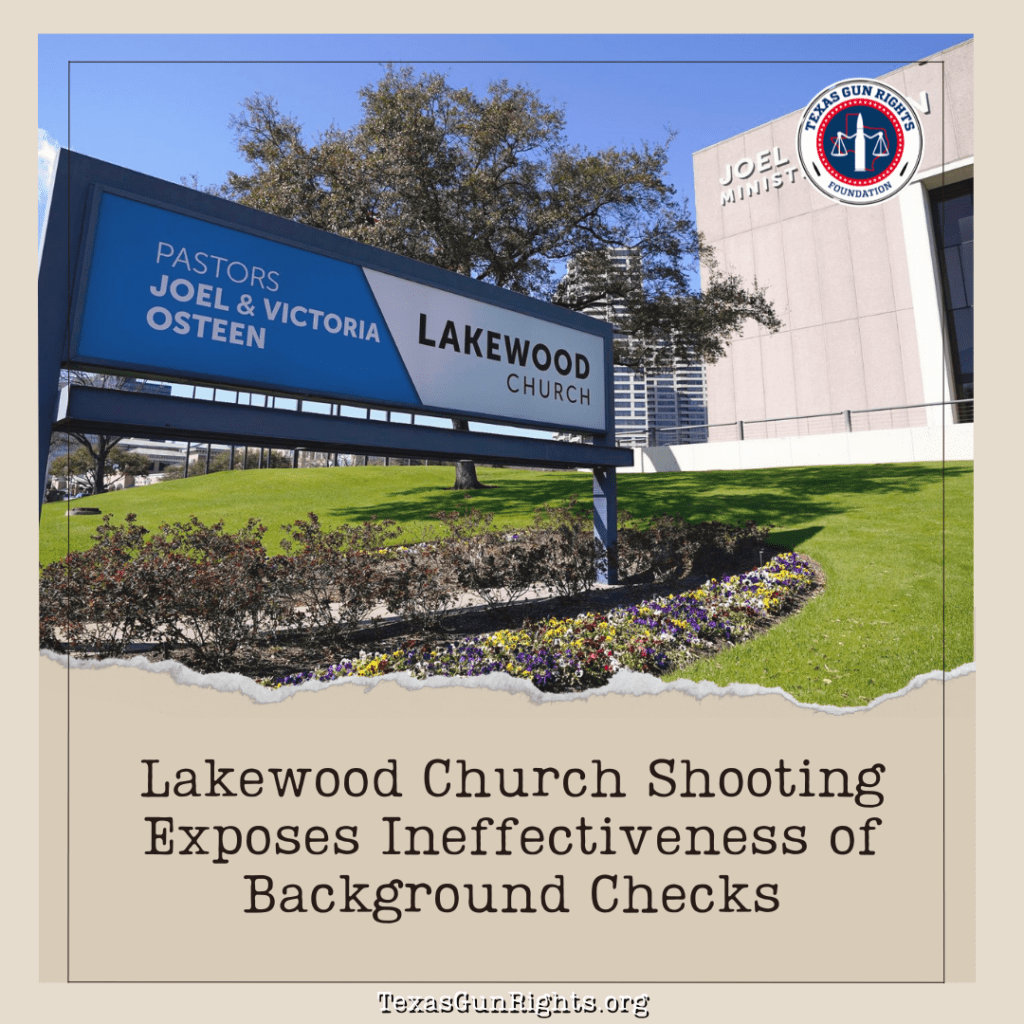
The tragic shooting at Lakewood Church by Genesse Moreno has sparked a significant conversation about the effectiveness of background checks.
Moreno, who also identified as Jeffrey Escalante, managed to pass the background check necessary to legally purchase a firearm, raising questions about the system’s ability to prevent firearms from falling into the wrong hands.
Moreno’s criminal background, dating back to 2005, includes charges ranging from assault and forgery to unlawful carrying of a weapon. Despite these “red flags,” the shooter was able to legally purchase the firearm used in the attack, highlighting a glaring loophole in the current background check system:
10/24/2005 – Harris County: Failure to stop and give information, sentenced to 20 days in Harris County Jail
8/6/2009 – Harris County: Assault – bodily injury, sentenced to 180 days in Harris County Jail for kicking a detention officer
5/28/2010 – Harris County: Forgery, sentenced to two days in Harris County Jail for trying to use a counterfeit $100 bill
11/3/2010 – Harris County: Theft, sentenced to 30 days in Harris County Jail for stealing hats and makeup
12/5/2010 – Harris County: Evading, sentenced to 75 days in Harris County Jail
6/15/2022 – Fort Bend County: Unlawful carrying of a weapon, still an active case
This incident not only questions the efficiency of the National Instant Criminal Background Check System (NICS) but also challenges the persistent narrative that gun control, especially universal background checks, are the solution to America’s gun violence.
The shooter’s possible identification as transgender adds to a disturbing trend noted by figures like Elon Musk, pointing to a series of attacks carried out by individuals with similar identification:

This aspect, coupled with Moreno’s firearm including a “Palestine” sticker, ignites debates on the shooter’s motives and the political ideologies they may represent. It’s also a reminder of the complex and multifaceted nature of such tragic events, which cannot be simplistically attributed to a single factor like gun ownership or lack thereof.
Far-left Democrats, often proponents of stringent gun control measures like universal background checks, overlook the reality that such policies do not effectively address the root causes of gun violence.
Instead, these measures potentially disarm law-abiding citizens, leaving them vulnerable to the very dangers these policies purport to mitigate. The inefficacy of background checks, as demonstrated by this incident, underscores the need for a reevaluation of current strategies in favor of more holistic approaches that address the underlying issues contributing to violence.
Moreover, the high rate of false positives in NICS denials, which exceeds 94%, further illustrates the system’s shortcomings. Such inaccuracies not only inconvenience innocent individuals but also divert resources from effectively monitoring and preventing actual threats. This incident at Lakewood Church serves as a stark reminder that reliance on background checks as a panacea for gun violence is misguided.
In light of these events, it becomes increasingly clear that the focus should shift towards solutions that respect the rights of law-abiding citizens while effectively targeting the root causes of violence. Strengthening mental health support, improving law enforcement capabilities, and fostering community engagement are crucial steps in this direction. It’s time to move beyond the flawed premise that gun control can safeguard our communities, and towards comprehensive strategies that genuinely enhance public safety without infringing on constitutional rights.

36 responses to “Lakewood Church Shooting Exposes Ineffectiveness of Background Checks”
What is the relevance of the word “Palestine?” Would it be different if it was “Semper Fi?”
I suggest there a number of Red Flags out there for elected politicians but those are ignored as well.
GTFOH with your anti American BS laced in political correctness. Go find your news in California.
Yes, it would be different. Semper Fi would be an avowal that the person had been a Marine. Palestine, on the other hand, shows that the person is out of touch with reality and approves of terrorism.
I agree. It will give the gun-hating Democrats (paranoid communists) more strength to ban veterans from owning firearms.
orrr like a pistol I bought used that says mossad, I guess that means I support Israel maybe but really it was a neat pistol I couldn’t resist.
I have pondered a purchase on Israeli sidearms. I dont know anything about them though.
WELL WRITTEN!
I disagree with the well written part. How do we know where the assaliant got the gun? I did not read where the purchase was documented. All this tells me is that a good guy with a gun was not close enough to stop the massacre as soon as it started.
Cant close the border either so close your mouth to gun control
Yes sir! I agree
The anti gun people will only say that the background checks are not thorough enough and will ask for more invasive background checks that probe deeper…..perhaps a lie detector test….etc. I dont think we really need that but that is where they will go.
Sorry Jim but those so called lie detector test are not at admissible in a court of law, it is a well known fact that they can be altered but the questionnaire to get any result that they may want. even the crooked CIA teaches it’s agents how to beat those test.
You know that most cities are anywhere from a year to more than 3 years behind in reporting arrests into NICS, right? Police chiefs say: “We don’t have the funding to hire support staff to input the data.”
I read where the mother-in-law tried to get leo’s involved but of course they were enjoying their donuts till the shtf. All it takes is for the judge’s staff to link the final outcome of a trial to the nics but that would solve a problem and reduce workload and maybe reduce the staff and therefore reduce the chiefs staff anf then maybe reduce his salary.
Hunter Biden, Joe Biden’s son breached the law and bought a gun. He has yet gone to jail
while a bunch of jan 6 people are still in jail and never charged.
Please Publish !
So true it is the root causes of violence we should look at and address. The gun is an inanimate object and can’t do harm without assistance from someone to pull the trigger.
I’m certain you know, as well as I do, the background check system is a garbage in/garbage out system regarding actual checks (example: Sutherland Springs, Texas and Devin Patrick Kelley). We know 100s (1000s?) of USAF discharged personnel were not reported into the background check system. I don’t recall seeing/learning the exact number. To my knowledge, none of the other services ever were tasked to check and verify proper reporting. We also know this is a unfunded federal mandate as I recall from the reporting on Sutherland Springs. I believe I save a report stating many small jurisdictions are delinquent/late in reporting into the system due to staffing and/or other issues. To my knowledge, the State of Texas has not worked to correct the reporting issues within Texas. I hope this is an issue of my not knowing Texas did/does address the issue and actively works to ensure timely/accurate reporting. I would suggest working with Judicial Watch (or other similar organizations) to request data from the Federal Government which discloses the state of the background check system database and sheds light on how poorly run it really is. I know this will require FOIA requests, following by numerous court challenges to obtain the data so it will be expensive to obtain the data. Probably worth while to help stem the tide of acrimony calling for universal checks.
when you buy a gun from say cabelas you enter all your info into what I am sure is a database because it is done with a tablet not a paperform that was they way it was done before this. Also if you have a cc liscense you are already checked out so it does go faster but still I am sure they are keeping this info on each purchase. Al;so I recently bought some ammo from a online ammo store that had ammo as part of the stores name and two of my cc’s were not approved without first calling the cc company. One card was a cabelas card. So big brother is doing a lot of unconstitutional stuff and he is too big to punch in the nose.
No system I’d perfect. But what additional checks do you want made? That’s obviously your point
Let’s back up for a moment! The Gun Laws prohibits a lawful citizen to carry a gun into a church. What if the off duty police officer had not been there that day?! How many lives would have been lost due to a stupid irrationial gun law?! These stupid gun laws is like a NEON SIGN for these Mentally Ill people to go shoot up and kill people!!! But NOOO!!! The law forbids us law abiding SANE people not to carry their PROTECTIVE weapon into the church!! The law abiding church goer isn’t the one mentally unstable!!! Well, with the FBI, they have it out for religious people. They are calling them terrorist now! But anyway, these laws are a drawing card for the mentally ill people wondering around listening to the voices in their heads!!!
Actually, the state of Texas changed the law on carry in places of religious worship in 2019. Now they allow people with a license to carry (LTC) are allowed to carry a gun in a place of worship, as long as the property owner does not properly post it prohibiting the practice.
In church shootings in Texas the shooter is usually eliminated immediately. Normally the second person to die. Sometimes the only person to die.
There is no gun law in Texas that prohibits carrying a weapon in church I am sure that you would find hundreds of legally carried guns at my church on any given Sunday. It is places like New York and California that have “stupid gun laws” like you reference.
Back when we were under the British rule of King Richard, the Tories would come to your home to collect taxes from you. They would indiscriminately confiscate whatever they wanted as they saw that they were the Law. One of my latter uncles got enough of it and shot a Torie and killed him. The Tories swore that they would eventually kill my uncle. It is said in our family history book that he never went “anywhere” without his flint lock rifle, even in Church, it laid right beside him.
Unless the local congregation has posted the required LEGAL notices to prohibit concealed or openly carried firearms, anyone may bring one to church. Texas law was changed a few years ago to allow them if not prohibited.
And I strongly recommend you run, not walk, away from any church that does not actively encourage armed congregants.
Texas law does not preclude a private citizen from carrying in a place of worship. It is the right of the responsible person or group to allow or prohibit carrying in a place of worship. In the case of a religious meeting place it would be church leadership (whatever form that might take) or in some cases the building owner to decide. This comports with The Second Amendment to the Constitution of The United States of America.
Every news report I read said there was a sticker on it that said Palestine, nothing about it being engraved. I don’t agree with the background checks I believe it’s violates our constitution. But this article looks like something that was written by a Democrat.
I would suggest that the background check address 2 or maybe 3 things that are currently ignored. And toss all the rest of the questions. 1) Are you taking psychotropic medication? 2) Do you identify as anything other than your biological sex? 3) Do you identify as a Democrat?
Sooo after reading hunters problems with lying on his gun form why do you think a crazy person would answer the right way on his or her form?
My favorite media response is, “the individual was known to law enforcement, but….”
Look how quiet the media is with the thugs in KC; I guarantee they are known to law enforcement as well.
The system performed as it should have in the church. The church had secured a “ armed safety team” as a precautionary step.
The federal 4473 that is to be filled out by an honest buyer was not performed , nor did the form read between the lines and prevent the sale. Like the firearm, it is an inanimate object that has no intent or extrasensory ability to detect a lie. Background checks are only as good as the honesty of the people who fill them out when a firearms are purchased from a dealer.
I wonder what name it was arrested under in all those offenses. Was SHE arrested multiple times, but applied for a firearm purchase as HE?? Different name, different gender, slips through the system, gets a weapon, starts shooting. Don’t know, haven’t heard a word one way or the other, but it comes to mind.
If a gun dealer refused to sell a gun to this transgender man because the Medical Association deemed trans as a gender dysphoria, a mental illness, then the Lawyers and Media would have roasted him and sued him for discrimination of a transgender, a member of the LGBTQ.
It is his mental illness and his hatred of Christians for being for Israel and against Palestine. And his hatred of Christians for teaching what the Bible says about LGBTQ lifestyles as an abomination to God. NOT that he is just another man going crazy with a gun and killing people.
Media needs to get the Narrative correct and tell the truth, not twist it to further their “agenda.”